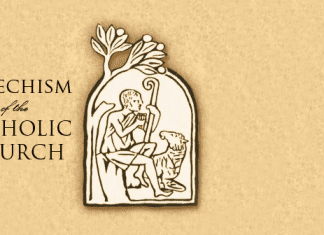Catechism of The Catholic Church #240
240 Jesus revealed that God is Father in an unheard-of sense: he is Father not only in being Creator; he is eternally Father by his relationship to his only Son who, reciprocally, is Son only in relation to his Father: "No one knows the Son except the Father, and no one knows the Father except the Son and any one to whom the Son chooses to reveal him."
Catechism of The Catholic Church #701
701 The dove. At the end of the flood, whose symbolism refers to Baptism, a dove released by Noah returns with a fresh olive-tree branch in its beak as a sign that the earth was again habitable. When Christ comes up from the water of his baptism, the Holy Spirit, in the form of a dove, comes down upon him and remains with him. The Spirit comes down and remains in the purified hearts of the baptized. In certain churches, the Eucharist is reserved in a metal receptacle in the form of a dove (columbarium) suspended above the altar. Christian iconography traditionally uses a dove to suggest the Spirit.
Catechism of The Catholic Church #2660
2660 Prayer in the events of each day and each moment is one of the secrets of the kingdom revealed to "little children," to the servants of Christ, to the poor of the Beatitudes. It is right and good to pray so that the coming of the kingdom of justice and peace may influence the march of history, but it is just as important to bring the help of prayer into humble, everyday situations; all forms of prayer can be the leaven to which the Lord compares the kingdom.
Catechism of The Catholic Church #2811
2811 In spite of the holy Law that again and again their Holy God gives them - "You shall be holy, for I the LORD your God am holy" - and although the Lord shows patience for the sake of his name, the people turn away from the Holy One of Israel and profane his name among the nations. For this reason the just ones of the old covenant, the poor survivors returned from exile, and the prophets burned with passion for the name.
Catechism of The Catholic Church #2206
2206 The relationships within the family bring an affinity of feelings, affections and interests, arising above all from the members' respect for one another. the family is a privileged community called to achieve a "sharing of thought and common deliberation by the spouses as well as their eager cooperation as parents in the children's upbringing."
Catechism of The Catholic Church #517
517 Christ's whole life is a mystery of redemption. Redemption comes to us above all through the blood of his cross, but this mystery is at work throughout Christ's entire life: -already in his Incarnation through which by becoming poor he enriches us with his poverty; - in his hidden life which by his submission atones for our disobedience; - in his word which purifies its hearers; - in his healings and exorcisms by which "he took our infirmities and bore our diseases"; - and in his Resurrection by which he justifies us.
Catechism of The Catholic Church #2226
2226 Education in the faith by the parents should begin in the child's earliest years. This already happens when family members help one another to grow in faith by the witness of a Christian life in keeping with the Gospel. Family catechesis precedes, accompanies, and enriches other forms of instruction in the faith. Parents have the mission of teaching their children to pray and to discover their vocation as children of God. The parish is the Eucharistic community and the heart of the liturgical life of Christian families; it is a privileged place for the catechesis of children and parents.
Catechism of The Catholic Church #272
272 Faith in God the Father Almighty can be put to the test by the experience of evil and suffering. God can sometimes seem to be absent and incapable of stopping evil. But in the most mysterious way God the Father has revealed his almighty power in the voluntary humiliation and Resurrection of his Son, by which he conquered evil. Christ crucified is thus "the power of God and the wisdom of God. For the foolishness of God is wiser than men, and the weakness of God is stronger than men." It is in Christ's Resurrection and exaltation that the Father has shown forth "the immeasurable greatness of his power in us who believe".
Catechism of The Catholic Church #2780
2780 We can invoke God as "Father" because he is revealed to us by his Son become man and because his Spirit makes him known to us. the personal relation of the Son to the Father is something that man cannot conceive of nor the angelic powers even dimly see: and yet, the Spirit of the Son grants a participation in that very relation to us who believe that Jesus is the Christ and that we are born of God.
Catechism of The Catholic Church #903
903 Lay people who possess the required qualities can be admitted permanently to the ministries of lector and acolyte. When the necessity of the Church warrants it and when ministers are lacking, lay persons, even if they are not lectors or acolytes, can also supply for certain of their offices, namely, to exercise the ministry of the word, to preside over liturgical prayers, to confer Baptism, and to distribute Holy Communion in accord with the prescriptions of law."














